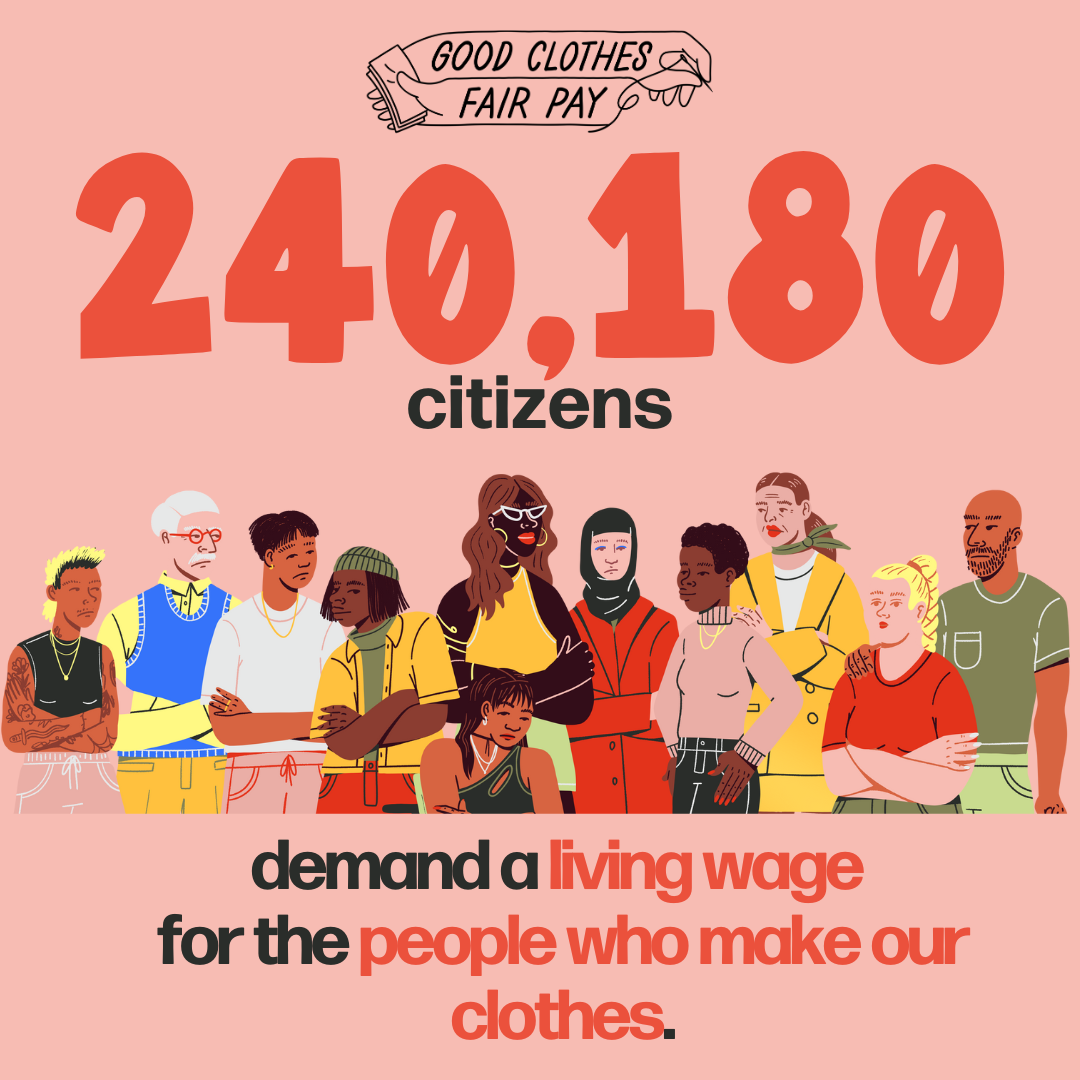More than 240 000 European citizens demand a Living Wage for the people who make our clothes around the world

Brussels, 20 July 2023 – The people who make our clothes cannot afford a sufficient and nutrient diet, to send their kids to school, to live in decent housing or to go to the doctor. This is because they earn on average 2 times less than a living wage: the salary needed to live in decent conditions. Yesterday at midnight, the Good Clothes, Fair Pay campaign, supported by the Fair Trade Advocacy Office along with many other organisations, came to an end, after having collected 240 180 signatures from EU citizens.
CITIZENS DEMAND CHANGE IN HOW THEIR CLOTHES ARE MADE
240,180 EU citizens signed the Good Clothes, Fair Pay campaign, a European Citizens Initiative, asking the EU to adopt legislation that requires EU textile and garment companies to ensure that workers in their supply chains are paid a living wage.
240,180 citizens demand fairer and more transparent supply chains and want brands to be held accountable when not respecting the rights of their workers. Citizens are also ready to change the way they consume but call for public policies that would make companies offer better products. A survey conducted in 2020 by Oney Group and OpinionWay in France, Spain, Portugal and Hungary, shows that 90% of European consumers are sensitive to sustainable consumption and expect brands to be committed and help them consume better. However, more than half of them do not believe the promises of brands concerning sustainability.
Although the Good Clothes Fair Pay European Citizens’ Initiative did not reach the signature goal needed to demand an official response from the European Commission, the number of signatures confirms that the impact of the textile industry on the human rights of its workers is an issue which mobilises increasing public support. Up to recently, Living Wages for garment workers was rarely at the forefront of public conversation about the impact of the fashion industry, and was almost never included in public policies aiming at making the fashion sector more sustainable.
THE EU NEEDS TO ACT NOW FOR A FAIRER TEXTILE INDUSTRY
A Living Wage and a Living Income is a human right and the EU needs to into account what workers and civil society, and now also more than 240 thousand citizens, are calling for and make way for a fairer fashion industry through both currently negotiated and potential EU-legislation:
Through an ambitious EU Directive on Corporate Sustainability Due Diligence. The EU is currently negotiating new legal obligations for the biggest companies on the EU market: they will have to identify, bring to an end, prevent, mitigate and account for negative human rights and environmental impacts in their value chains. Negotiations between the Council, the Parliament and the Commission are undergoing right now and key points will need to be addressed for the final text to be impactful for the people in textile supply chains:
- The final text needs to explicitly refer to both Living Wages for workers and Living Incomes for smallholders or self-employed producers, to ensure that both garment workers and cotton producers receive a fair remuneration allowing them to live in decent conditions.
- The Directive needs to explicitly require companies to assess the impact of their business model and their purchasing, trading and pricing practices on human rights and to take measures to prevent, mitigate and address the harm that they are causing.
- The text from the Commission created a Due Diligence obligation solely for the biggest companies. Around 99% of EU textile companies are SMEs and available research shows that smaller brands collectively represent a significant amount of the garment industry. Excluding them from the scope of Due Diligence obligations runs the risk of leaving many garment workers unprotected. The EU should at least follow the proposed scope by the Parliament that includes the most companies and aligns the scope with the sustainability reporting obligations under the Corporate Sustainability Reporting Directive.
- The Directive must make clear that engagement with stakeholders should be at the centre and done in a meaningful way at every step of the Due Diligence process in line with the OECD Guidelines.
The coming months will be key for achieving an ambitious and impactful legislation. Join us to ask our governments and members of the European Parliament for a strong law – check out the Justice is Everybody’s Business Campaign and Action Toolkit!
Towards the prohibition of Unfair Trading Practices (UTPs) in the textile sector. The Good Clothes, Fair Pay campaign calls for the prohibition of Unfair Trading Practices which cause, or contribute to, harms to workers. These include, among others, payment delays, order cancellation and prices under the cost of production. As asked by the EU Parliament in its report of the Sustainable Textiles Strategy, the European Commission should introduce legislation to prohibit UTPs in the textile sector, similar to what was introduced for the agri-food sector in an EU Directive from 2019. Read more on how such a legislation could look here.
By pushing for an enabling policy environment for Living Wages and Living Incomes. All governments committed to improve the textile sector should consider joining the Joint Declaration on Living Wage and Living Income signed by the Dutch, German, Belgian and Luxembourgish governments. They commit to collaborating to implement measures to integrate Living Incomes and Wages into their public policies on sustainable supply chains, at national and EU levels.
For any questions around our work on Fair and Sustainable Textiles or Due Diligence legislation, please contact May Hylander at hylander@fairtrade-advocacy.org.